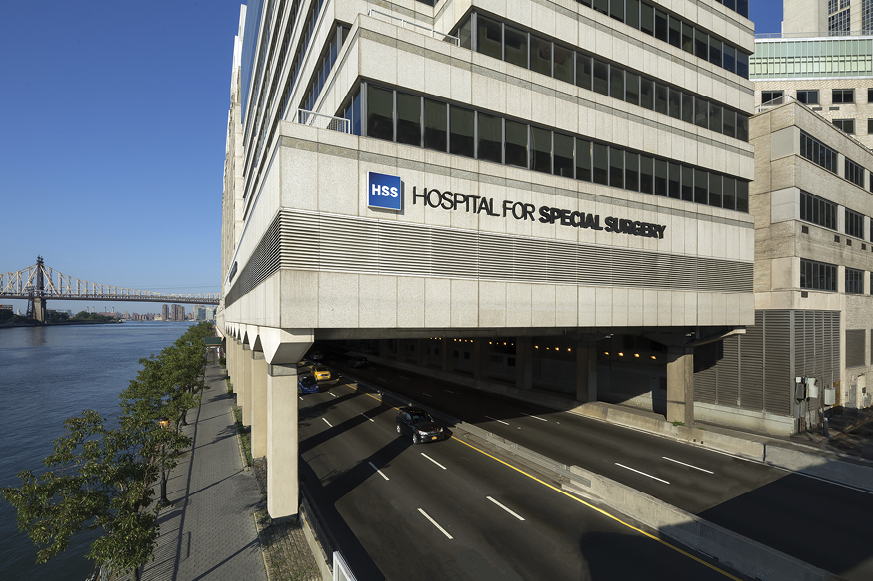- Home
- Media Kit
- MediaJet
- Current Issue
- Past Issues
- Ad Specs-Submission
- Ad Print Settings
- Reprints (PDF)
- Photo Specifications (PDF)
- Contact Us
![]()
ONLINE
![]()
ONLINE

Leadership by All
Editors’ Note
Lou Shapiro assumed his current position in October 2006. Previously, he served as Executive Vice President and Chief Operating Officer of Geisinger Health System’s Clinical Enterprise. He began his career at Allegheny General Hospital in Pittsburgh and then joined McKinsey & Company as a leader within their healthcare practice. Shapiro is a fellow of the American College of Healthcare Executives, former Chair of the Greater New York Hospital Association Board of Governors (2014-2015), and serves on multiple nonprofit boards.
Institution Brief
HSS (hss.edu) is the world’s leading academic medical center focused on musculoskeletal health. At its core is Hospital for Special Surgery, nationally ranked number one in orthopedics (for the 13th consecutive year) and number three in rheumatology by U.S. News & World Report (2022-2023), and named a leader in pediatric orthopedics by U.S. News & World Report “Best Children’s Hospitals” (2022-2023). HSS has a main campus in New York City and a growing network of related facilities. In addition to patient care, HSS leads the field in research, innovation, and education. Through HSS Global Ventures and the HSS Education Institute, the institution is collaborating with medical centers and other organizations to advance the quality and value of musculoskeletal care and to make world-class HSS care more widely accessible nationally and internationally. HSS is the official hospital for a number of professional sports organizations and teams including the New York Giants, New York Mets, New York Knicks, Brooklyn Nets, UFC, US Rowing, US Biathlon, US Lacrosse, and USA Basketball. HSS is one of only three hospitals in the United States designated as a Medical Center of Excellence by FIFA.
How do you define HSS’ purpose and mission?
Our purpose is the cornerstone of HSS and the reason why we exist – to help people get back to what they need and love to do better than any other place in the world.
With respect to patient care, our mission is singularly focused on delivering the highest quality care, improving mobility, and enhancing quality of life for all. To do this, we must also be at the forefront of research, innovation, and education – enabling the most talented people to achieve an outsized collective impact on individuals, communities, businesses, and societies. After nearly 160 years, HSS has become the world’s largest academic medical center specializing in musculoskeletal health, but we are only beginning to fulfill our purpose. The need and opportunity for impact has never been greater.

HSS main campus on Manhattan’s East Side
What have been the keys to the strength and leadership of HSS in the industry?
As an organization, we at HSS operate under the philosophy of “Leadership By All,” where everyone is a leader regardless of their individual role. This philosophy is what allows us to provide the very best care to patients every single day. It’s one of the reasons we as an organization have been ranked the top hospital in the nation for orthopedics for 13 consecutive years by U.S. News and World Report and the world #1 according to Newsweek.
What will be the impact of the expansion of the HSS campus with its new 12-story tower and what can HSS patients expect from this new tower?
To continue to meet the growing demand for our unmatched care, HSS is investing in new facilities and enhancement to our Upper East Side campus, as well as in beautifying the neighborhood. At the heart of this plan is the construction of the Anna-Maria and Stephen Kellen Tower. Rising 12 stories over the FDR Drive, this new 94,000-square-foot clinical building will adjoin our current main hospital facility. The tower is made possible due to the generous support of our Board and donor community, including our lead donor, the Anna-Maria and Stephen Kellen Foundation.
The HSS Kellen Tower will expand care for joint replacement and spine conditions with three private inpatient floors, physician offices and exam rooms, and on-site imaging to support our high-quality musculoskeletal care. The added capacity created by these new inpatient units and renovation of recovery floors in the main hospital will allow HSS to convert from 30 to 70 percent private patient rooms across the main campus, an institutional priority underscored by the pandemic and necessary to optimize the healing environment for our patients.

Rendering of the new Anna-Maria and Stephen Kellen Tower
Will you highlight HSS’ investment and commitment to research and the work of the HSS Research Institute?
Since its founding more than 150 years ago, HSS has been a leader in research aimed at improving the lives of patients suffering from debilitating orthopedic and rheumatic conditions such as arthritis, bone and soft tissue injuries, autoimmune diseases, and musculoskeletal pain and deformities. Today, the HSS Research Institute has garnered more than $60 million in our federal grant portfolio, $35 million in industry funding, and has published more than 1,300 articles in 2021 alone, with over 300 dedicated personnel identifying mechanisms underlying these conditions, and developing effective approaches for prevention, diagnosis, and treatment. With a focus on tissue repair, improving surgical outcomes, autoimmunity and inflammation, genomics, new treatments, and precision medicine, the impact of our discoveries – many of which are only happening at HSS – determine future directions of musculoskeletal research to best improve clinical outcomes.
How critical is it for HSS to build a diverse and inclusive workforce to mirror the diversity of the patients and communities it serves?
Inclusive diversity is a key success factor in almost any organization, and it requires deliberate commitment and action. The benefits go well beyond mirroring the patients and communities we serve; diverse experiences and perspectives unlock new ideas and enlighten conventional thinking. We are making progress, but still have much to do. Diversity has been enshrined as a core value of HSS, and we have evolved our structure and added expertise to support this. We don’t see it as a separate priority, but rather as central to fulfilling our purpose.
Will you discuss HSS’ commitment to advancing global health and the delivery of humanitarian services?
HSS is dedicated to helping those around us, both in our own community and across the world. We do this through our patient care, education, innovation, as well as humanitarian work. One example is the HSS Global Health initiative, which supports the delivery of care for vulnerable populations through volunteer work. Over the years, our reach has included providing orthopedic care in West Africa, training anesthesia providers in India, and bringing medical care to Haiti. In the United States, we provide care and support in many ways beyond our focus on musculoskeletal health. Most recently, we looked disaster in the face with the arrival of the COVID-19 pandemic which caused us to change in previously unimaginable ways and become a strategic part of New York City’s community response.
HSS is headquartered in New York City. What do you see as the advantages that New York provides from a talent and recruitment standpoint?
At HSS, we are constantly adapting to a changing landscape as needs and priorities shift. If you do everything exactly how you were doing it in years past, you will not succeed. New York has a tremendous opportunity to continue to grow and evolve as a city. Cultivating a diverse community at HSS is, and always has been, a critical ingredient in our culture and New York City provides an extraordinarily diverse population of talent.
As we all know, building a diverse and inclusive workforce requires an ongoing commitment. While HSS continues to progress in recruiting diverse talent throughout our organization, there is still a lot of work to be done. The challenges we face are not unique to our industry, but we are committed to continuing to meet our goals.
What advice do you offer young people interested in building a career in medicine?
Stay true to your values and principles, especially during difficult times, and never settle for the status quo. There’s always room for improvement. A commitment to continuous improvement on the part of everyone at HSS is what has made us the world-class organization we are today.![]()